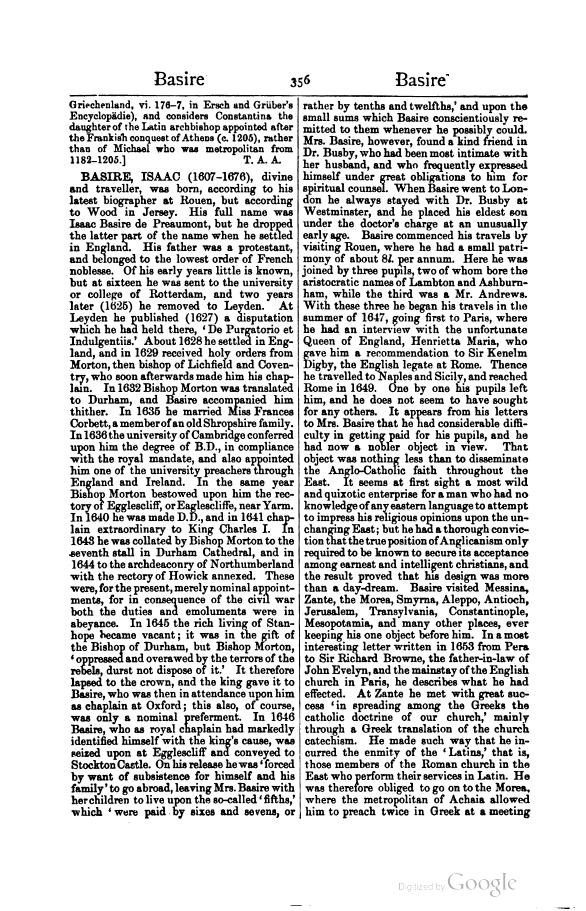Griechenland, vi. 176–7, in Ersch and Grüber's Encyclopädie), and considers Constantina the daughter of the Latin archbishop appointed after the Frankish conquest of Athens (c. 1205), rather than of Michael who was metropolitan from 1182–1205.]
BASIRE, ISAAC (1607–1676), divine and traveller, was born, according to his latest biographer at Rouen, but according to Wood in Jersey. His full name was Isaac Basire de Preaumont, but he dropped the latter part of the name when he settled in England. His father was a protestant, and belonged to the lowest order of French noblesse. Of his early years little is known, but at sixteen he was sent to the university or college of Rotterdam, and two years later (1625) he removed to Leyden. At Leyden he published (1627) a disputation which he had held there, ‘De Purgatorio et Indulgentiis.’ About 1628 he settled in England, and in 1629 received holy orders from Morton, then bishop of Lichfield and Coventry, who soon afterwards made him his chaplain. In 1632 Bishop Morton was translated to Durham, and Basire accompanied him thither. In 1635 he married Miss Frances Corbett, a member of an old Shropshire family. In 1636 the university of Cambridge conferred upon him the degree of B.D., in compliance with the royal mandate, and also appointed him one of the university preachers through England and Ireland. In the same year Bishop Morton bestowed upon him the rectory of Egglescliff, or Eaglescliffe, near Yarm. In 1640 he was made D.D., and in 1641 chaplain extraordinary to King Charles I. In 1643 he was collated by Bishop Morton to the seventh stall in Durham Cathedral, and in 1644 to the archdeaconry of Northumberland with the rectory of Howick annexed. These were, for the present, merely nominal appointments, for in consequence of the civil war both the duties and emoluments were in abeyance. In 1645 the rich living of Stanhope became vacant; it was in the gift of the Bishop of Durham, but Bishop Morton, ‘oppressed and overawed by the terrors of the rebels, durst not dispose of it.’ It therefore lapsed to the crown, and the king gave it to Basire, who was then in attendance upon him as chaplain at Oxford; this also, of course, was only a nominal preferment. In 1646 Basire, who as royal chaplain had markedly identified himself with the king's cause, was seized upon at Egglescliff and conveyed to Stockton Castle. On his release he was ‘forced by want of subsistence for himself and his family’ to go abroad, leaving Mrs. Basire with her children to live upon the so-called ‘fifths,’ which ‘were paid by sixes and sevens, or rather by tenths and twelfths,’ and upon the small sums which Basire conscientiously remitted to them whenever he possibly could. Mrs. Basire, however, found a kind friend in Dr. Busby, who had been most intimate with her husband, and who frequently expressed himself under great obligations to him for spiritual counsel. When Basire went to London he always stayed with Dr. Busby at Westminster, and he placed his eldest son under the doctor's charge at an unusually early age. Basire commenced his travels by visiting Rouen, where he had a small patrimony of about 8l. per annum. Here he was joined by three pupils, two of whom bore the aristocratic names of Lambton and Ashburnham, while the third was a Mr. Andrews. With these three he began his travels in the summer of 1647, going first to Paris, where he had an interview with the unfortunate Queen of England, Henrietta Maria, who gave him a recommendation to Sir Kenelm Digby, the English legate at Rome. Thence he travelled to Naples and Sicily, and reached Rome in 1649. One by one his pupils left him, and he does not seem to have sought for any others. It appears from his letters to Mrs. Basire that he had considerable difficulty in getting paid for his pupils, and he had now a nobler object in view. That object was nothing less than to disseminate the Anglo-Catholic faith throughout the East. It seems at first sight a most wild and quixotic enterprise for a man who had no knowledge of any eastern language to attempt to impress his religious opinions upon the unchanging East; but he had a thorough conviction that the true position of Anglicanism only required to be known to secure its acceptance among earnest and intelligent christians, and the result proved that his design was more than a day-dream. Basire visited Messina, Zante, the Morea, Smyrna, Aleppo, Antioch, Jerusalem, Transylvania, Constantinople, Mesopotamia, and many other places, ever keeping his one object before him. In a most interesting letter written in 1653 from Pera to Sir Richard Browne, the father-in-law of John Evelyn, and the mainstay of the English church in Paris, he describes what he had effected. At Zante he met with great success ‘in spreading among the Greeks the catholic doctrine of our church,’ mainly through a Greek translation of the church catechism. He made such way that he incurred the enmity of the ‘Latins,’ that is, those members of the Roman church in the East who perform their services in Latin. He was therefore obliged to go on to the Morea, where the metropolitan of Achaia allowed him to preach twice in Greek at a meeting
